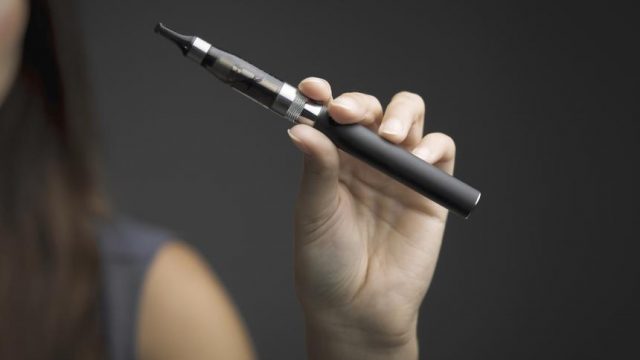Marty Riske: Raising Taxes on Tobacco and Vaping Is Not a Good Solution

E-cigarette in woman's hand close up
This November, the voters of North Dakota will have several divergent ballot measures to weigh in on. One such measure is a brazen attempt to socially engineer behavior with the state’s tax code.
Newspaper editorial boards such as the Fargo Forum and Grand Forks Herald have already decided this tax increase is the way to go, even before any real public discussion has taken place. Why is there such a hurry to levy a new tax in a state that has been cutting taxes?
Measure #4 on the November ballot is a 400% increase of the current tax on tobacco products. Typically, liberals are the first to decry policies that would adversely affect low-income individuals and families. In the case of tobacco taxes, there is a strong push to use the tax system to push people into doing the healthy thing, rather than to actually help people to quit.
As someone who was addicted to tobacco for over 40 years, I can appreciate the problem being addressed. The solution, however, will not have as positive of a result as the proponents of such social engineering policy would like.
[mks_pullquote align=”right” width=”300″ size=”24″ bg_color=”#ffffff” txt_color=”#000000″]Before we levy a massive tax increase on what will affect low income consumers the most, let’s find out why we have a state agency that is supposed to help people quit smoking but would rather sit on nearly $50 million. [/mks_pullquote]
The fact is that when tobacco gets more expensive, those with limited funds will cut back on other expenses to be able to afford their addiction. For example, a parent will cut back on milk and breakfast to support an addiction. This goes for tobacco more any other substance, even heroin. The legality of an addictive substance does not change how an addict reacts to price changes. The addiction comes first, at the cost of everything else.
We are told that because the state has a budget crisis, the revenue generated by this major increase in tobacco taxes will fund a critical needs of healthcare.
If that is the case, why is the Tobacco Prevention and Control Trust Fund sitting on $45.6 million? Are they simply waiting to use those dollars to promote this tax increase for the ballot measure? We all know that the Center for Tobacco Prevention and Control is a defacto lobbyist group, funded by public dollars. Dollars which could be used to help people quit smoking rather than promoting a political agenda.
Should we let a state-funded lobbying group use the ballot box to create a tax revenue stream while state agencies such as Human Services are cutting their budgets?
Smoking is an addiction, and it is an epidemic.
Historically, government’s involvement in the tobacco industry is well known with tobacco farm subsidies and promoting the habit to members of the military as part of their rations. It is naive to expect that a government effort to pry more tax dollars out of consumers, especially low income consumers, will result in a net benefit to society. Why hurt young families with a regressive tax like a tobacco and vape tax?
Before we levy a massive tax increase on what will affect low income consumers the most, let’s find out why we have a state agency that is supposed to help people quit smoking but would rather sit on nearly $50 million.
Let’s see some results before we give them more to add to their slush fund. So far, all they have really been able to prove is that they can spend a lot of public money to ban smoking in public places, and funnel that money to highly connected advertising agencies.




